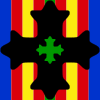| Part of a series of articles on the |
| Modern persecution of Coptic Christians |
|---|
 |
| Overview |
| Terrorist attacks |
| Figures |
The 2005 Alexandria riot was an anti-Christian riot in the Egyptian port city of Alexandria. The riot erupted on 21 October when a group of Muslims staged a demonstration outside St. George's, a Coptic church, to protest a play they said offended Islam which resulted in 3 deaths. [1] The situation got out of hand after some protesters began throwing stones at the building and at police who were present at the scene.